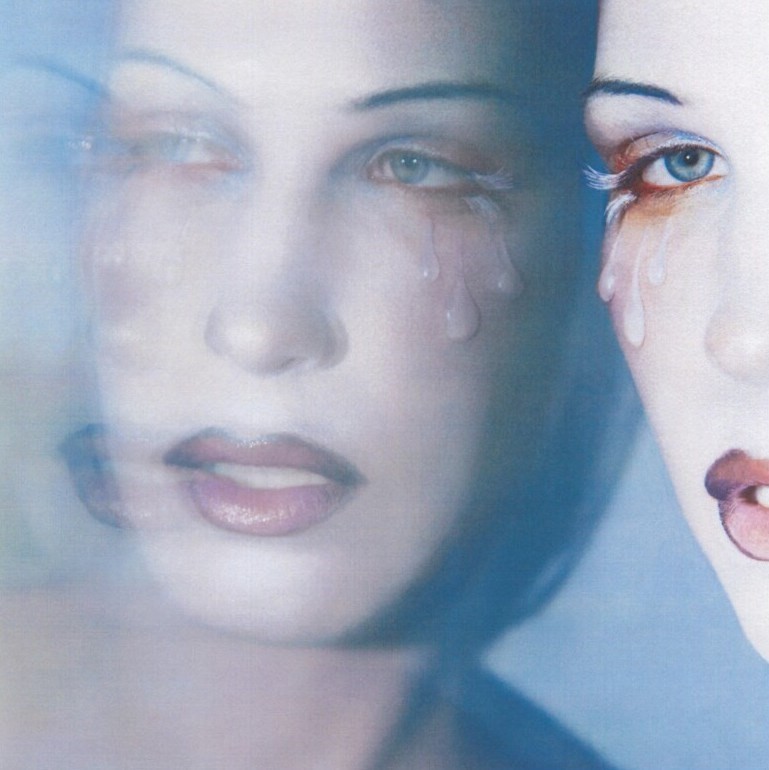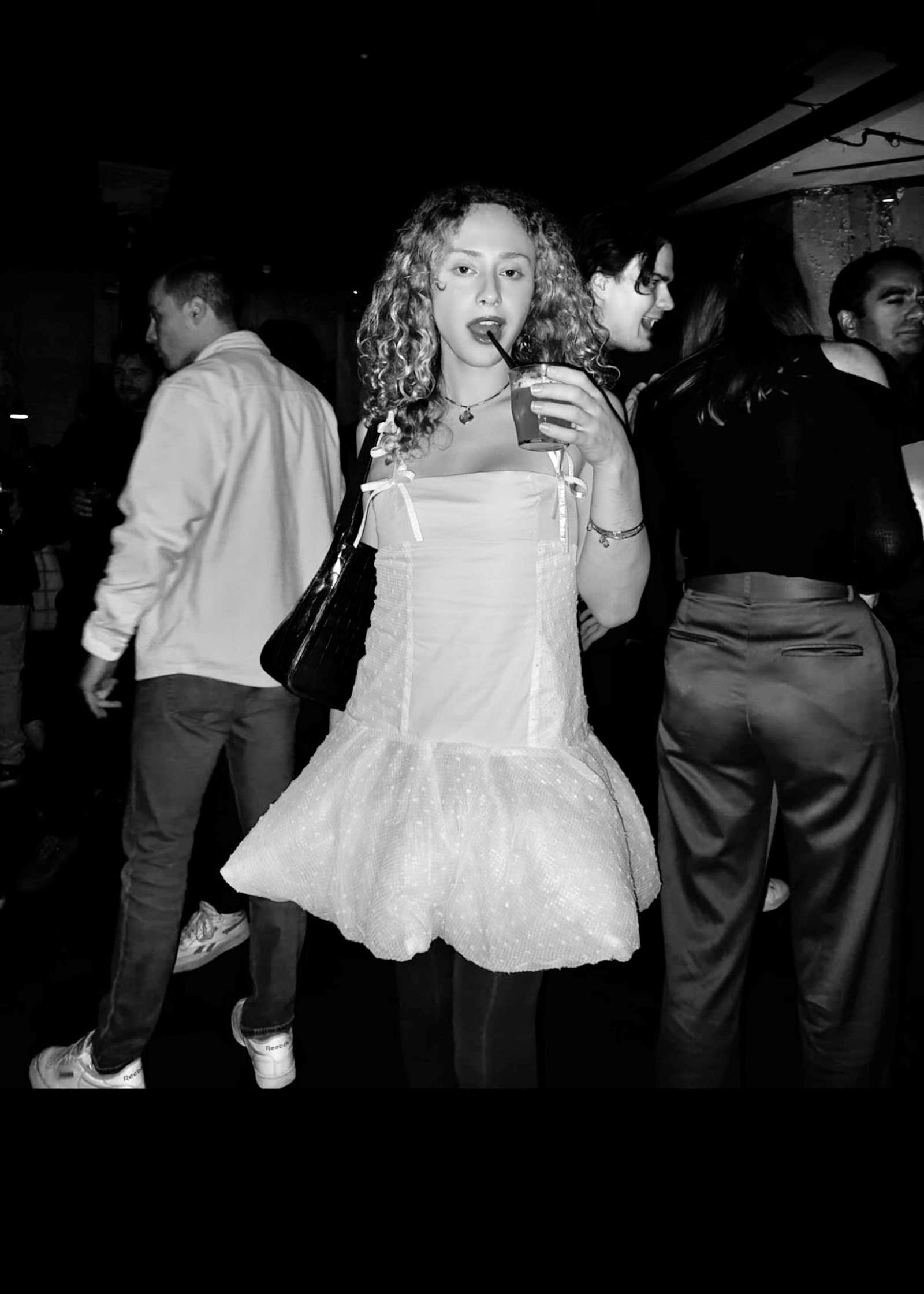I’m evaporating
Into something weightless
Don't make me wait
Don't make me wait
– Solid Liquid Gas, Eartheater
Have you ever heard a song that feels like a mirror to your deepest desire?
I have a friend who jokes that Eartheater is actually trans. Not because she’s transitioned, but because “she’s so cunt”. Now, I can’t unsee it: should such raw sensuality be defined by anything else? Eartheater’s body is adorned with symbols of transsexualism, from her sultry, skinny brows to the way her diamond–crusted corset pushes on her tits. Her exaggerated sex overspills conventional womanhood.
So, a cis woman passing as trans? When my friend points out the possibility, I usually laugh: it sounds absurd that things could ever work the other way around. This could be my way of casually denying the possibility, though. Because when I think about it for too long, I start to feel dizzy – a dissociation, perhaps, at the thought of the margins merging. Something splits inside me. It’s like I’ve forgotten a dream I’ve only just remembered and have spent a lifetime trying to grasp.
I have never been able to live in silence. Each period of my life has been marked by a form of fixation, filling my ears from morning to night. When I started hormones, it was a song by Eartheater about the three states of matter – Solid Liquid Gas from the album Trinity. It was the perfect conceit: science was, to me, not just a physical phenomenon, but, emotional too. Modern medication was changing my body, slowly creating a new vessel to hold my most desired self. Eartheater sings about the eagerness of rain to become mist: “I don’t wanna resist the bliss of this weightless state”. With oily oestrogen the edges became softer, the muscles melted. It was as though humidity had blessed my entire being.
A few years ago, I started to notice I was being recognised as a woman in public: I passed, surpassing one body, slipping seamlessly into another. A cisgirl, sort of. Many trans women I knew during this time seemed to be dating in stealth, a practice that appears to be becoming more common. It seemed like the ultimate test of passibility to spend an entire evening with a man without him catching on, and I was desperate to experience it for myself. Some people called me “brave”, others thought I was reckless. One friend of mine, a researcher of transphobia, asked if it was worth the risk. “I just want to feel like a normal girl,” I’d say.
And so I began to date without revealing my history, meaning the obsession with Eartheater grew – something in the acceleration of my own transformation, perhaps. Each day, the feminising effects of the hormones became more pronounced. Of course, I knew my body was changing in this way, but that wasn’t enough. I wanted a witness – a stranger’s desire to catalyse the whole process; I wanted to be questioned about my supposed childhood as a girl so I could forget about my “true” origins: boy-girl-woman. By appearing cis, I could rewrite this timeline, never looking back.
In the film Monica, a woman returns home to care for her mother who is suffering with dementia, living out her last days. She doesn’t recognise Monica, who left home years ago to transition. Rather, she believes she is a nurse from the hospital. During a scene in which Monica bathes her, the mother peers into her eyes and gently kisses her. There is a sense that she has seen something different in Monica, now. Submerged in foaming water, she appears to have glimpsed, for the first time, her daughter’s hidden past. Looking back at this vision is what Monica sees, too, which is everything she’s traded to pass as a woman. Soon after, the mother forgets it ever happened.
“What I mean to say is that I would do anything to not just feel like I want to be a woman, but to feel with certainty that I am, immutably, a woman” – Alexandra Diamond-Rivlin
It’s not that I’m unaware of the compromise Monica makes in order to become a trans woman who appears like a cis woman: she loses her ability to be easily recognisable to her family, something that ultimately leaves her heartbroken. Rather, it’s that appearing cis feels like something I must accomplish, whatever the consequences may be. I can’t picture being loved as a trans girl without hiding parts of myself. I can’t picture desire for my transness without it feeling like a painful resurrection of the past. Verse one, Solid Liquid Gas: “Ice cold eyes, ice cold eyes,” the line repeats. What I mean to say is that I would do anything to not just feel like I want to be a woman, but to feel with certainty that I am, immutably, a woman. Chorus: “the sight of you has me evaporating”.
During one of my more recent dates, I let my transness slip. It was my own memory that crept up on me. “Well, it wasn’t exactly trans–friendly,” I mentioned about my old school days. The admission stunned; a rare shock wore his face. Then, after a long pause, he took a drag of his vape, blew it out and said, “I had no idea.” He had no idea. Once again, I felt that euphoric feeling at the encounter with my own plausible cisness, except this time it was even better because I had it in words. His disbelief made a vanishing act of my whole pre-transition body. He lost it in Lost Mary! The vapour above his head and up by the ceiling sent ripples of pleasure up my spine. I was weightless.
That night when I got home, I read Maggie Nelson: “I touched myself every night in my narrow bed and came thinking of you, knowing all the while that I was planting the seeds of a fresh disaster.”
Then I fell asleep and dreamed about another candle-lit evening:
I sipped on some dark cocktail, observing the chorus of smokers outside. He was late, so, filling time, I went to the bathroom to touch up my make-up. In the mirror, I saw a dark purple margin painted around my mouth, the inside filled with this liquid pearl. My face, a portrait of noughties nostalgia, looked like Eartheater’s in the Y2k-inspired album cover of Trinity. It was a bizarre moment to have felt like I had actually become her, or possibly she had become me. I wasn’t too sure. It doesn’t help that we share the same birth name, Alex.

Either way, I stood staring at this strange effigy of cis womanhood, the boundaries of which I couldn’t quite make out because the fog from the stage near the bar was leaking inside the women’s toilets. I pressed my hands onto the walls and pushed myself backward, hoping I’d have enough force to throw my body outside the room and land somewhere near where I had started.
Despite the thickening haze, I could vaguely make out my location which was inside a long corridor. Hopefully, it would lead me back. It wasn’t silent here – thank goodness – I could hear the frothing dance track play, its pulverised drumming beneath ecstatic arpeggio.
Walking felt like moving against a current – the sensation but not the act of moving backward. I continued walking anyway, trusting the sounds would lead me in the right direction as they reverberated through my body.
Then, exhausted, I came closer to what appeared to be a door, an entrance, or an exit through which a nebulous light emerged. Had I found my way back, at long last? I tried to think back but even memory escaped me. Was I well beyond the point of no return?
I wondered if the mist would, at some point, fall so I could see more clearly. How strange – I had spent years trying to forget my origins, but now I had no recollection of them at all, and I was utterly lost. A body without a score. And this is all I can remember: I am a person who wants to forget! Perhaps I made a mistake, something too troubling to remain in memory. Why else would I try to hide the past from myself? I tried to picture being lifted to the light so I could view my body without all this smoke. I thought about how being able to see my skin again might remind me of how I got here. Perhaps I could discern a scar or birthmark, a trace of the person I was before she passed out of sight.
